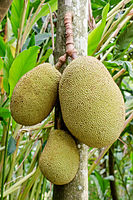
Photo from wikipedia
Abstract Jackfruit seeds are an underutilized waste in many tropical countries. This study aimed to characterize the functional properties, mainly solubility at different temperatures and times, and compare aromas of… Click to show full abstract
Abstract Jackfruit seeds are an underutilized waste in many tropical countries. This study aimed to characterize the functional properties, mainly solubility at different temperatures and times, and compare aromas of roasted jackfruit seed flours with those of cocoa and commercial chocolate powders. Three types of jackfruit seed flour, dry, acidified, and fermented, were measured for solubility, water uptake, wettability, apparent density, particle size, viscosity, sensory preference, and intensity of chocolate aroma (N = 72 panelists). A central composite design was used to optimize solubility and water uptake. Solubility was optimized (r2 >0.7) by adjusting the temperature and time of seed fermentation and comparing its properties to those of commercial chocolate. The fermented jackfruit seeds flour showed higher solubility and wettability than other flours. The viscosity of jackfruit seed flours was low and their solubility was high, properties desirable for cocoa powder. The cocoa powder, acidified and fermented jackfruit seed showed the same water uptake (p ≥0.05). Chocolate aroma was more intense for fermented jackfruit seeds, and aroma preference were not different (p ≥0.05) among all flours. When compared to cocoa powder and commercial chocolate, the jackfruit seed flours showed better solubility and wettability. The water uptake, apparent density and viscosity of the jackfruit seed flours were similar to that observed for cocoa powder and commercial chocolate, as well as the sensory chocolate aroma. Results showed that the jackfruit seed flours might be used as an ingredient for cocoa replacer.
Journal Title: Food bioscience
Year Published: 2020
Link to full text (if available)
Share on Social Media: Sign Up to like & get
recommendations!